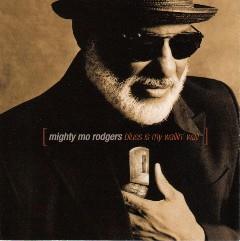Mighty Mo Rodgers - Blues Is My Wailin' Wall (1999)
Mighty Mo Rodgers - Blues Is My Wailin' Wall (1999)

1 Blues Is My Wailin' Wall 3:19 2 Took Away The Drum 4:15 3 Heaven's Got The Blues 4:14 4 No Regrets 4:56 5 Tuskegee Blues 2:25 6 No Dough 2:15 7 The Kennedy Song 3:37 8 (Bring Back) Sweet Soul Music 5:00 9 Willie B And Me 3:34 10 Gone Fishin' 4:20 11 Shamel 5:46 Mighty Mo Rodgers (Piano, Accordion, Keyboards, Vocals, Kalimba) Chirs Walsh (Guitar) Albie Burks (Bass) Burleigh Drummond (Drums) Tim Pierce (Guitar) Rasheed Ali (Percussion) George James (Percussion) David L. Woodford (Sax) Kenny Walker (Sax) Michael Murphy (B-3) Harold Bennett (Tenor Sax) Steve F'dor (piano) Vic Shoemaker (harmonica) Jim Gibson (guitar)
Mighty Mo Rodgers has a rough but limber singing voice that commands attention. His metaphorical lyrics reveal a strong passion for history and social issues. Unfortunately, the instrumentation on this major-label debut isn't nearly as intriguing as the vocals.
Rodgers is a singer-keyboardist who made his mark in the '60s playing with Brenton Wood, T-Bone Walker, Bobby "Blue" Bland and Albert Collins. On Wailin' Wall, the 55-year-old Los Angeles native favors a minimalist drum-centered sound that's as much R&B as blues.
It's tempting to recommend the album based on one track alone — the African-influenced "Took Away The Drum." This is a very dramatic chant-like number, and its title refers to the slave masters' prohibition of African-style drumming. Unfortunately, the rest of the songs are either instrumentally facile ("Sweet Soul Music"), overproduced ("Shame!") or more poems than songs ("Tuskegee Blues").
"The Kennedy Song" seems to put down conspiracy theorists and New Age nuts, but Rodgers' lyrics are so cryptic it's impossible to decipher his real message. Even when his lyrics are effective, as on "Tuskegee Blues," his band seems uninspired. It could be the leader was holding them back in order to experiment with an airy soul-blues soundscape. There's an awful lot of atmosphere to this recording, but it makes for a murky listen. Whatever Rodgers' intention, his minimalist approach generates one great song and 10 mediocre ones. Too bad, because Rodgers has a powerful voice, a strong social conscience, and a way with words. Maybe he should concede the producing to someone else. ---Ed Kopp, allaboutjazz.com
download (mp3 @320 kbs):
yandex mediafire ulozto gett bayfiles
Last Updated (Wednesday, 13 March 2019 17:40)
